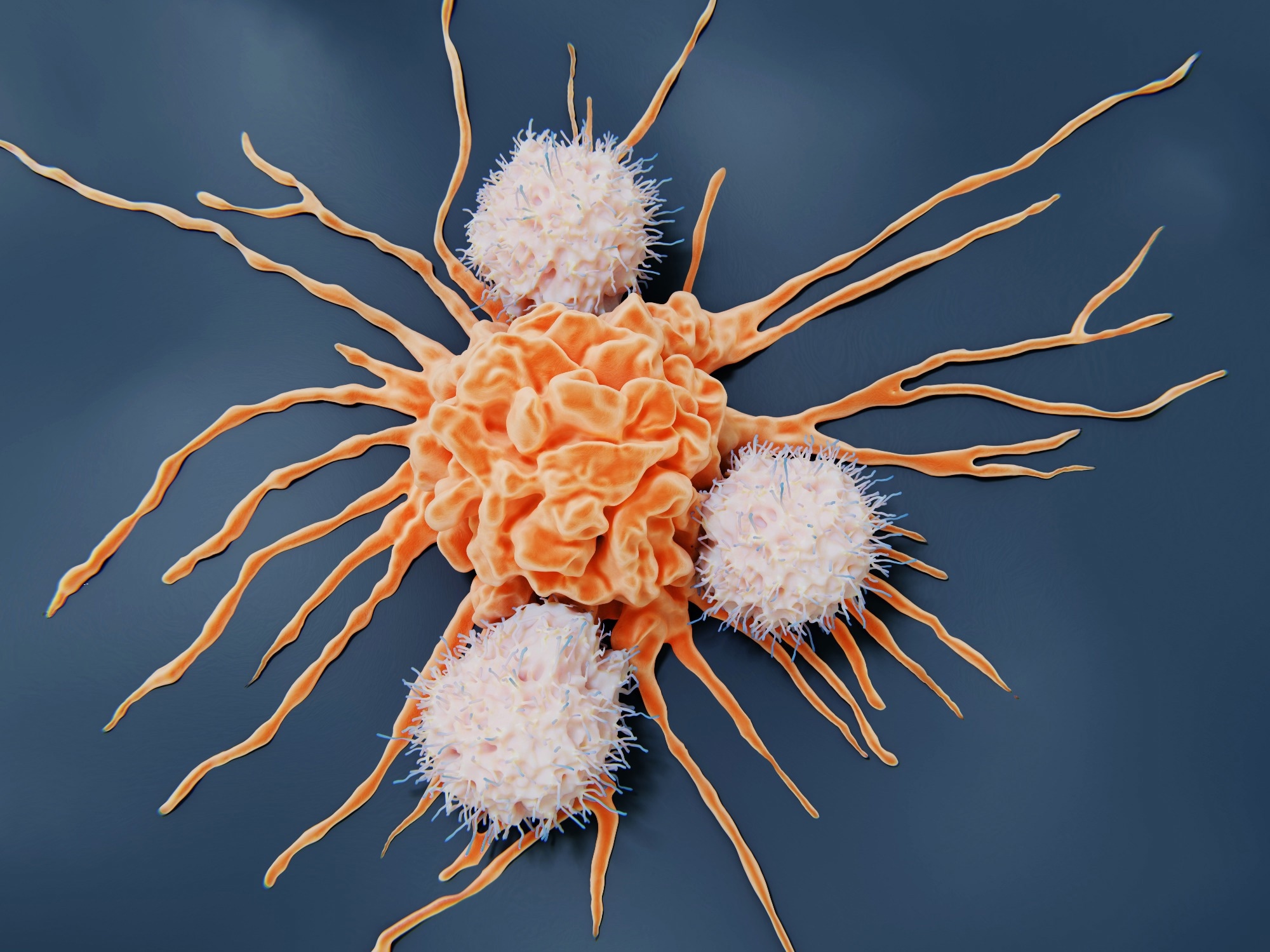Immunodiagnosis: Unleashing the potential of personalized immunotherapy
A recent review published in Frontiers in Immunology introduces the concept of immunodiagnosis (ID), outlines its features, and explores the potential of artificial intelligence (AI) in constructing ID systems for precise tumor immunotherapy.
 Study: Immunodiagnosis — the promise of personalized immunotherapy. Image Credit: Juan Gaertner / Shutterstock.com
Study: Immunodiagnosis — the promise of personalized immunotherapy. Image Credit: Juan Gaertner / Shutterstock.com
Background
The immune system is crucial for maintaining health, and its dysfunction can lead to various diseases, including cancer. Immunotherapy has emerged as a promising approach to treating tumors; however, its effectiveness varies among patients and can cause adverse effects.
Understanding the patient's immune status before immunotherapy can help predict outcomes and guide personalized treatment. This concept, which has been termed ID, involves evaluating the immune system comprehensively and dynamically.
Currently used biomarkers used for ID are limited and fail to capture the complexity of immune interactions. To address this limitation, AI can be used to construct robust ID models by analyzing large and complex datasets. Moreover, AI combined with bioinformatics tools has shown promise in disease diagnosis and prognosis.
Establishing immune status baseline: Stratifying population for ID
Studies showed that demographic characteristics such as sex, age, race, and ethnicity influence immune status, thus necessitating initial population stratification for ID.
Sex
There are significant differences in immune responses and susceptibility to immune disorders between males and females. Women generally have a stronger immune response but are also more prone to adverse side effects.
Age
The decline in immune function with age affects immune cell composition and inflammatory mediators. The impact of age on the efficacy and safety of immunotherapy is still unclear but varies depending on the disease type.
Race and ethnicity
Racial and ethnic disparities exist in tumor incidence, mortality, and access to immunotherapy. Different races and ethnicities exhibit variations in immune cell subsets and signaling activation.
Race or ethnicity may influence the efficacy and toxicity of immunotherapy; however, the relationship depends on the treatment strategy and disease type.
Health conditions regulate ID
Physiological or pathological status affects immune fluctuations based on stratified demographics.
Body Mass Index (BMI)
Obesity has been associated with inflammation and can affect immune cell distribution and abundance. High BMI has been linked to improved outcomes in immunotherapy; however, this association may vary by sex, treatment setting, and tumor type. Low BMI and cachexia are associated with poorer outcomes.
Exposure to drugs and food
Certain drugs, such as acetaminophen (APAP), have been found to negatively affect immunotherapy outcomes. Antibiotic exposure has been associated with decreased efficacy, whereas probiotics may have a beneficial effect.
Gut microbiota
The gut microbiome plays a crucial role in cancer development and response to therapy. Specific bacteria have been shown to enhance the efficacy of immunotherapy.
However, the composition of the gut microbiota can vary, and its impact on immunotherapy outcomes is still being investigated.
Pregnancy
Pregnancy involves immune fluctuations that can affect immunotherapy. The expression levels of immune-related molecules, such as programmed death-1 (PD-1) and programmed death ligand-1 (PD-L1), can vary during pregnancy.
Limited data are available on the safety and outcomes of immunotherapy during pregnancy.
Viral infection
Viral infections, such as severe acute respiratory syndrome coronavirus 2 (SARS-CoV-2), hepatitis B and C viruses (HBV/HCV), and human immunodeficiency virus (HIV), can impact immune status and immunotherapy outcomes. SARS-CoV-2 infection has complex effects on the immune system and can affect the efficacy and safety of immunotherapy.
Role of biomarkers in ID
Biomarkers are the direct predictors in ID systems. Ideal biomarkers should be accurate, discriminative, repeatable, and involved in disease mechanisms or therapeutic targets.
Major biomarkers related to tumor-immune interactions are categorized into five groups including tumor-stimulated immune response, immune recognition, immune evasion, immune system response, and genomic/transcriptomic/protein signatures. Examples include deficient mismatch repair (dMMR), tumor mutation burden (TMB), PD-L1 expression levels, and peripheral tumor antigen-specific T-cell expansion.
Successful cases, such as predictive models based on gene expression profiles, highlight the potential of biomarkers in ID systems. Nevertheless, further validation and understanding of immune mechanisms are needed for their clinical application.
AI empowering immunotherapy
AI plays a crucial role in constructing an ID system for cancer management. Machine learning (ML) algorithms such as Logistic Regression, Decision Trees, and Support Vector Machines, as well as deep learning (DL) techniques like convolutional neural networks (CNN) and recurrent neural networks (RNN) enable the analysis of various data types including clinical images, genomic data, and unstructured data.
AI has been successfully applied in diagnosing cancers such as breast, lung, skin, and ovarian cancer, achieving comparable accuracy to specialist physicians. Furthermore, AI facilitates the standardization of diagnostic criteria, identification of unstructured data, personalized drug development, and the integration of multidimensional data.
However, challenges remain in terms of data accessibility, interpretability of AI algorithms, and addressing errors. A comprehensive ID system empowered by AI can contribute to precise tumor immunotherapy and patient monitoring.
Conclusions
The current review discusses the concept of ID and construction of an ID system for immune-related diseases. Immunotherapy outcomes reflect individual heterogeneity, thus highlighting the need for ID before treatment planning.
Biomarkers offer promising potential for ID systems; however, further validation and understanding of immune mechanisms are needed for their clinical application. Integrating multidimensional information with AI methods can create an ideal ID system.
Further research and advancements in AI, combined with an improved understanding of immune and tumor development, will lead to more accurate and sensitive ID systems in clinical practice.
- Wang, R., Xiong, K., Wang, Z., et al. (2023). Immunodiagnosis — the promise of personalized immunotherapy. Frontiers in Immunology. doi: 10.3389/fimmu.2023.1216901
Posted in: Device / Technology News | Medical Science News | Medical Research News | Medical Condition News | Disease/Infection News | Healthcare News
Tags: Acetaminophen, Antibiotic, Antigen, Artificial Intelligence, Bacteria, Bioinformatics, Body Mass Index, Cachexia, Cancer, Cell, Coronavirus, Deep Learning, Diagnostic, Drugs, Efficacy, Food, Gene, Gene Expression, Genomic, HBV, Hepatitis, Hepatitis B, HIV, Immune Response, Immune System, Immunodeficiency, Immunology, Immunotherapy, Inflammation, Ligand, Machine Learning, Microbiome, Mortality, Mutation, Obesity, Ovarian Cancer, PD-L1, Pregnancy, Probiotics, Protein, Research, Respiratory, SARS, SARS-CoV-2, Severe Acute Respiratory, Severe Acute Respiratory Syndrome, Skin, Syndrome, T-Cell, Tumor, Virus

Written by
Susha Cheriyedath
Susha has a Bachelor of Science (B.Sc.) degree in Chemistry and Master of Science (M.Sc) degree in Biochemistry from the University of Calicut, India. She always had a keen interest in medical and health science. As part of her masters degree, she specialized in Biochemistry, with an emphasis on Microbiology, Physiology, Biotechnology, and Nutrition. In her spare time, she loves to cook up a storm in the kitchen with her super-messy baking experiments.


